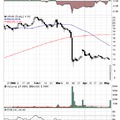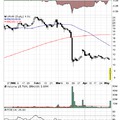Taleb cikk:
When consuming information, we strive for more signal and less noise. Intuitively we feel like the more information we consume the more signal we receive. While this is probably true on an absolute basis, Nassim Taleb argues in this excerpt from his forthcoming book, Antifragile, that it is not true on a relative basis. He contends that as you consume more data, and the ratio of noise to signal increases, the less you know what’s going on and the more inadvertent trouble you are likely to cause.
The Institutionalization Of Neuroticism
Imagine someone of the type we call neurotic in common parlance. He is wiry, looks contorted, and speaks with an uneven voice. His necks moves around when he tries to express himself. When he has a small pimple his first reaction is to assume that it is cancerous, that the cancer is of the lethal type, and that it has already spread. His hypochondria is not just in the medical department: he incurs a small setback in business and reacts as if bankruptcy were both near and certain. In the office, he is tuned to every single possible detail, systematically transforming every molehill into a mountain. The last thing you want in life is to be in the same car with him when stuck in traffic on your way to an important appointment. The expression overreact was designed with him in mind: he does not have reactions, just overreactions.
Compare him to someone with the opposite temperament, imperturbable, with the calm under fire that is considered necessary to become a leader, military commander or a mafia godfather. Usually unruffled and immune to small information —they can impress you with their self-control in difficult circumstances. For a sample of a composed, call and pondered voice, listen to interviews of “Sammy the Bull” Salvatore Gravano who was involved in the murder of nineteen people (all competing mobsters). He speaks with minimal effort. In the rare situations when he is angry, unlike with the neurotic fellow, everyone knows it and takes it seriously.
The supply of information to which we are exposed under modernity is transforming humans from the equable second fellow to the neurotic first. For the purpose of our discussion, the second fellow only reacts to real information, the first largely to noise. The difference between the two fellows will show us the difference between noise and signal. Noise is what you are supposed to ignore; signal what you need to heed.
Indeed, we have been loosely mentioning “noise” earlier in the book; time to be precise about it. In science, noise is a generalization beyond the actual sound to describe random information that is totally useless for any purpose, and that you need to clean up to make sense of what you are listening to. Consider, for examples, elements in an encrypted message that have absolutely no meaning, just randomized letters to confuse the spies, or the hiss you hear on a telephone line and that you try to ignore in order to just focus on the voice of your interlocutor.
Noise and Signal
If you want to accelerate someone’s death, give him a personal doctor.
One can see from the tonsillectomy story that access to data increases intervention —as with neuroticism. Rory Sutherland signaled to me that those with a personal doctor on staff should be particularly vulnerable to naive interventionism, hence iatrogenics; doctors need to justify their salaries and prove to themselves that they have some work ethics, something “doing nothing” doesn’t satisfy. Indeed at the time of writing the personal doctor or the late singer Michael Jackson is being sued for something that is equivalent to overintervention-to-stifle-antifragility (but it will take the law courts a while before they become familiar with the concept). Conceivably, the same happened to Elvis Prestley. So with overmedicated politicians and heads of state.
Likewise those in corporations or in policymaking (like Fragilista Greenspan) endowed with a sophisticated statistics department and therefore getting a lot of “timely” data are capable of overreacting and mistaking noise for information —Greenspan kept an eye on such fluctuations as the sales of vacuum cleaners in Cleveland “to get a precise idea about where the economy is going”, and, of course micromanaged us into chaos.
In business and economic decision-making, data causes severe side effects —data is now plentiful thanks to connectivity; and the share of spuriousness in the data increases as one gets more immersed into it. A not well discussed property of data: it is toxic in large quantities —even in moderate quantities.
The previous two chapters showed how you can use and take advantage of noise and randomness; but noise and randomness can also use and take advantage of you, particularly when totally unnatural —the data you get on the web or thanks to the media.
The more frequently you look at data, the more noise you are disproportionally likely to get (rather than the valuable part called the signal); hence the higher the noise to signal ratio. And there is a confusion, that is not psychological at all, but inherent in the data itself. Say you look at information on a yearly basis, for stock prices or the fertilizer sales of your father-in-law’s factory, or inflation numbers in Vladivostock. Assume further that for what you are observing, at the yearly frequency the ratio of signal to noise is about one to one (say half noise, half signal) —it means that about half of changes are real improvements or degradations, the other half comes from randomness. This ratio is what you get from yearly observations. But if you look at the very same data on a daily basis, the composition would change to 95% noise, 5% signal. And if you observe data on an hourly basis, as people immersed in the news and markets price variations do, the split becomes 99.5% noise to .5% signal. That is two hundred times more noise than signal —which is why anyone who listens to news (except when very, very significant events take place) is one step below sucker.
There is a biological story with information. I have been repeating that in a natural environment, a stressor is information. So too much information would be too much stress, exceeding the threshold of antifragility. In medicine, we are discovering the healing powers of fasting, as the avoidance of too much hormonal rushes that come with the ingestion of food. Hormones convey information to the different parts of our system and too much of it confuses our biology. Here again, as with the story of the news received at too high a frequency, too much information becomes harmful. And in Chapter x (on ethics) I will show how too much data (particularly when sterile) causes statistics to be completely meaningless.
Now let’s add the psychological to this: we are not made to understand the point, so we overreact emotionally to noise. The best solution is to only look at very large changes in data or conditions, never small ones.
Just as we are not likely to mistake a bear for a stone (but likely to mistake a stone for a bear), it is almost impossible for someone rational with a clear, uninfected mind, one who is not drowning in data, to mistake a vital signal, one that matters for his survival, for noise. Significant signals have a way to reach you. In the tonsillectomies, the best filter would have been to only consider the children who are very ill, those with periodically recurring throat inflammation.
There was even more noise coming from the media and its glorification of the anecdote. Thanks to it, we are living more and more in virtual reality, separated from the real world, a little bit more every day, while realizing it less and less. Consider that every day, 6,200 persons die in the United States, many of preventable causes. But the media only reports the most anecdotal and sensational cases (hurricanes, freak incidents, small plane crashes) giving us a more and more distorted map of real risks. In an ancestral environment, the anecdote, the “interesting” is information; no longer today. Likewise, by presenting us with explanations and theories the media induces an illusion of understanding the world.
And the understanding of events (and risks) on the part of members of the press is so retrospective that they would put the security checks after the plane ride, or what the ancients call post bellum auxilium, send troops after the battle. Owing to domain dependence, we forget the need to check our map of the world against reality. So we are living in a more and more fragile world, while thinking it is more and more understandable.
To conclude, the best way to mitigate interventionism is to ration the supply of information, as naturalistically as possible. This is hard to accept in the age of the internet. It has been very hard for me to explain that the more data you get, the less you know what’s going on, and the more iatrogenics you will cause.
A bejegyzés trackback címe:
Kommentek:
A hozzászólások a vonatkozó jogszabályok értelmében felhasználói tartalomnak minősülnek, értük a szolgáltatás technikai üzemeltetője semmilyen felelősséget nem vállal, azokat nem ellenőrzi. Kifogás esetén forduljon a blog szerkesztőjéhez. Részletek a Felhasználási feltételekben és az adatvédelmi tájékoztatóban.

